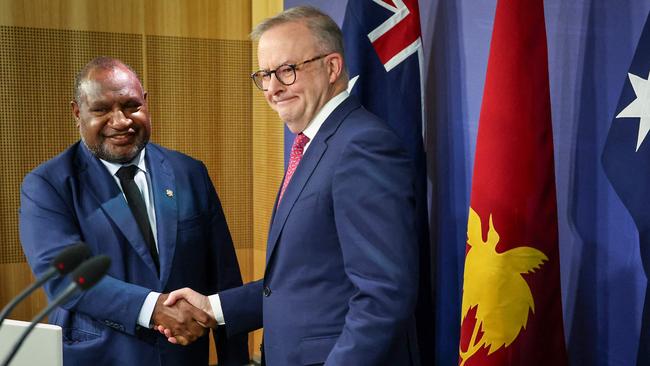
Australian taxpayers shell out about that much on aid to PNG every year, but few could point to tangible benefits for the country where 40 per cent of people continue to survive on less than $5 a day.
The NRL deal is an entirely different proposition.
PNG is rugby league mad, and the sport is its national game. Its elevation to the NRL is a nation-building moment and binds the country to Australia more tightly than ever.
As the deal was formally announced, James Marape called Anthony Albanese “my brother” and described him as a “visionary”, underscoring the immense gratitude in PNG that Australia has made this happen.
Albanese shares Marape’s love of the game, but as he said in their joint press conference, the deal is also about Australia’s self interest.
PNG provides a natural security buffer to Australia, and it is vital to Australia that the country remains unified and functional.
Marape knows it, telling this correspondent recently: “If PNG becomes a failed state then trust me, you will have 10 million Papua New Guineans trying to overrun Australia in canoes.”
But there is a bigger and more immediate strategic imperative at the heart of this sports diplomacy coup – the need to keep China out of PNG, at least in a security sense.
Australia could never tolerate a Solomon Islands-style security agreement between Beijing and its nearest neighbour, and the NRL deal ensures any such proposal would gain absolutely no traction with Port Moresby.
Unlike recent deals with Tuvalu and Nauru, Australia will not have an explicit veto over PNG’s future security relationships.
But clauses in the confidential NRL agreement make clear that it is contingent on ongoing “strategic trust” between the countries, and that Australia can terminate its funding for the PNG side at any time if that trust is undermined.
China could offer PNG a fortune to try and gain a security foothold in the country, but no PNG prime minister in his right mind would entertain such an offer, because to do so would risk the country’s hard-fought participation in the NRL.
As Marape said on Thursday, the deal is about much more than rugby league. “This is more than a game – it is a symbol of unity and mutual respect,” he said.
PNG will do everything in its power to hold up its side of the bargain to make its team a success when it enters the league in 2028. The country’s people would tear down any leader who jeopardised that prospect.








Spending $600m over a decade on a Papua New Guinean NRL team is a stunningly good investment in Australia’s national security.